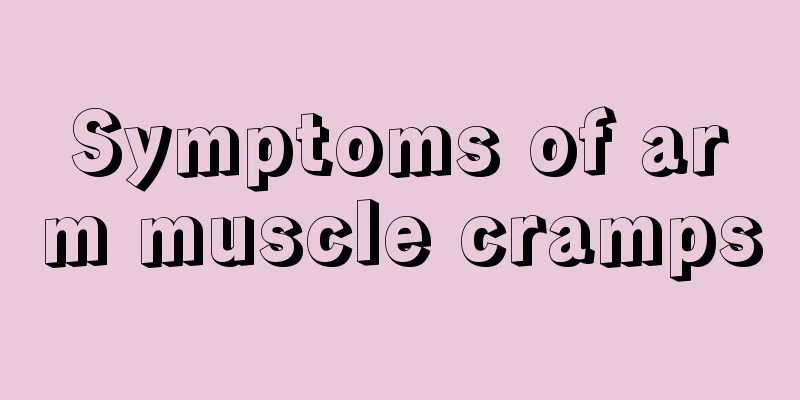Symptoms of arm muscle cramps

|
Human limbs are flexible and controlled by the brain, and arms and legs are relatively important parts. Because the reason why people can walk independently is because they have their own arms and legs. However, arm muscle diseases can also occur, and this is often due to problems with the intensity of exercise, such as excessive exertion. Arms can also experience spasms, so what are the symptoms of arm muscle spasms? 1. Symptoms of arm muscle cramps When muscles twitch involuntarily, people often express anxiety and fear. In fact, there is no need to be alarmed by "fun twitching". The fluttering of most patients is benign, which is medically known as "benign fasciculation syndrome". Benign fasciculation syndrome is a common neurological symptom characterized by involuntary fasciculations in local muscles of the body. It is most common on the face and limbs and will not progress to other serious neurological diseases. 2. Causes of arm muscle twitching Amount of salt excretion: In summer, we sweat a lot, and a large amount of salt will be excreted, which may cause cramps, so we should also pay attention to maintaining a balanced salt ratio. Eating too much salt is not good. Low calcium can cause seizures. Calcium ions are a coupling factor of excitation-contraction and their effect is positive. But this refers to after the excitement occurs; for fast-response cells that mainly produce depolarization due to the influx of sodium ions caused by the opening of fast sodium channels, the high extracellular calcium of calcium ions inhibits the influx of sodium ions due to the existence of the "membrane barrier effect", and the excitability is reduced. When extracellular calcium is low, the "membrane barrier effect" of calcium ions is weakened and cell excitability increases. When calcium is low, the "membrane barrier function" of calcium ions is weakened, cell excitability increases, and cells become easily excited. On the other hand, the excitation-contraction coupling ions in the sarcoplasm, calcium ions, did not decrease due to low extracellular calcium. Skeletal muscle has rich sarcoplasmic reticulum, which stores sufficient calcium. The release of sarcoplasmic reticulum calcium can rapidly increase the calcium concentration in the sarcoplasm, triggering the excitation-contraction coupling, so this link is not affected. Therefore, when calcium is low, on the one hand, the cells are easily excited because the membrane barrier function is weakened, and on the other hand, the excitation-contraction coupling is not affected, so it manifests as muscle twitching. |
<<: What are the symptoms of anxiety
>>: What are the symptoms of late liver rehydration
Recommend
What is the reason for having such a good appetite
Everyone's stomach capacity is different, so ...
What is rheumatic heart disease? Symptoms and signs should be taken seriously
Rheumatic heart disease is most common among the ...
Progress in the etiology of teratoma
Speaking of teratoma, I believe you will show an ...
What methods are there to remove acne?
The appearance of acne marks or acne is actually ...
There is pain and yellow discharge from the ear
Ear pain and yellow discharge are typical symptom...
How to make fried egg vermicelli without sticking to the pan?
The nutritional value of vermicelli is very high....
What are the harms of thyroid cancer to the human body?
What are the hazards of thyroid cancer to the hum...
Hip range of motion
The hip joint is the most important part of the h...
What are the symptoms of autoimmune hemolytic anemia
Autoimmune hemolytic anemia is caused by a disord...
Will tongue cancer endanger the patient's life?
Will tongue cancer endanger the patient's lif...
Several main non-surgical treatments for colon cancer
For patients with colon cancer, in addition to su...
Pain and swelling below the belly button
Most people don't pay attention to pain when ...
Introducing effective nursing methods for small cell lung cancer
Introduce the effective nursing methods for small...
What are the latest treatments for atrial fibrillation
Heart disease is one of the killers that threaten...
Which foods can prevent bile duct cancer
Food supplements are worse than medicine suppleme...









